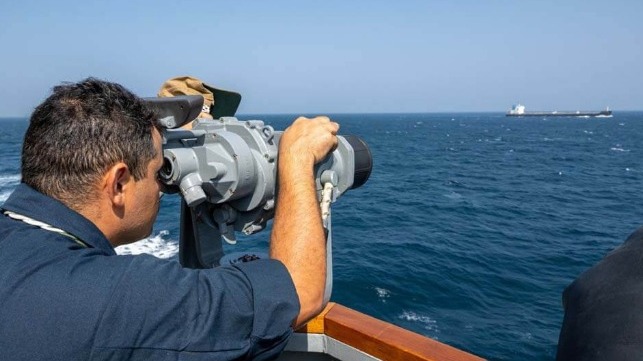QatarEnergy Joins Growing List of Ships Heeding Advice to Avoid Red Sea

The global shipping industry is broadly following the warnings from the Combined Military Force, trade groups, and security consultants, all of which are advising ships to avoid the Red Sea. Initially, it was mostly containerships, but the short-term warnings issued after Thursday’s strikes appear to have broadly impacted the shipping industry.
Citing tracking services, both Bloomberg and Reuters are reporting that QatarEnergy, the world’s second-largest exporter of LNG and the leading supplier to Europe, decided over the weekend to suspend all transits of the Red Sea. This comes at a period of high demand as Europe is in the peak period during its winter months. Bloomberg for example highlights that Qatar supplies a third of LNG imports to the UK while countries such as Germany and Finland established LNG import terminals last year to make up for the loss of Russian gas.
Tracking data shows that three of the largest LNG carriers operating under charter to Qatar, the Al Ghariya, Al Huwaila, and Al Nuaman, each with over 200,000 cbm capacities, were holding off Oman while two southbound LNG in the Red Sea were holding south of the Suez Canal. Reuters quotes a senior official saying that it is not a production halt but that they are seeking security advice and may reroute the vessels around Africa.
The UK’s Defence Minister Grant Shapps reports he met today with his counterpart in Qatar to “discuss the situation in the Red Sea and regional security. Shapps highlights that they have a “shared interest in maintaining stability in the Middle East.”
Analysts point out that if Qatar reroutes the vessels it would increase the trip by a third from the typical 18-day transit adding nine or more days. It would also drive up the price of gas due to the added transportation costs.
Qatar is not alone in its moves. S&P is reporting that Japan’s Mitsui O.S.K. Lines is limiting transits of the Red Sea and the NYK is also considering changing routes for its vessels. Reuters also reports that at least six tankers appeared to pause or divert sailings on Monday, with most south of the Red Sea, although one reversed course in the Red Sea going back to the Suez Canal. They calculate that at least fifteen vessels have diverted since the U.S. and UK strikes on Thursday and the follow-up by the U.S. on Friday.
Major tanker companies including Euronav, Torm, Hafnia, and Stena Bulk have all now reported diverting from the Red Sea. In December, BP and Equinor also announced they would be suspending transits of the region due to security concerns. This follows a report by Container xChange last week that 500 of 700 containerships scheduled to transit the Red Sea have been diverted. The cruise ship Silver Moon, operated by Royal Caribbean Group’s Silversea Cruises diverted on Saturday transiting the Suez Canal and heading for Piraeus, Greece curtailing a cruise due to have gone to Aqaba, Jordan.
The Suez Canal Authority tried to calm fears reporting that 44 ships would be transiting on Saturday. They released photos showing a Grimaldi car carrier, COSCO product tanker, and two CMA CGM containerships all making the transits, but media reports said the authority's revenues are down 20 percent in the first days of 2024.
So far, the most direct impact appears to be in the car industry. Reuters reports that Suzuki is halting production in Hungary this week. Tesla and Volvo reported last week that they were also pausing production due to supply issues.
“It is currently not possible to foresee how the security situation develops, but the present security conditions may prevail for still some time,” BIMCO wrote today in a public statement. “Coalition forces and BIMCO continue to recommend shipping companies to consider avoiding shipping operations,” the trade group wrote both in the Gulf of Aden near Yemen and the southern Red Sea. Similarly, the trade group INTERTANKO (International Association of Independent Tanker Owners) also advised members last Friday to avoid the Red Sea region.

that matters most
Get the latest maritime news delivered to your inbox daily.
The U.S. Maritime Administration also reiterated a caution extending its recommendation to consider avoiding the region from an initial 72-hour warning now to last till February 5. They are following the advice of the U.S. Naval Forces Central Command which issued the first caution shortly after Thursday’s strikes.
Oil prices were already creeping up last week. Today they are remaining below $73 a barrel in New York but analysts expect the prices will continue to rise on the uncertainty in the markets. The disruptions to Qatar’s gas shipments are expected to contribute to increases in the LNG markets as well.
